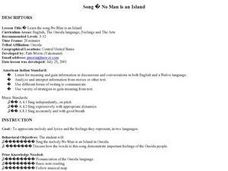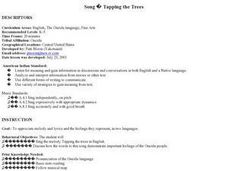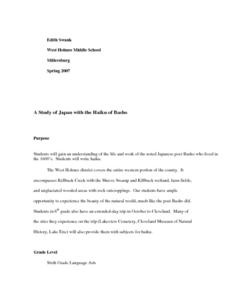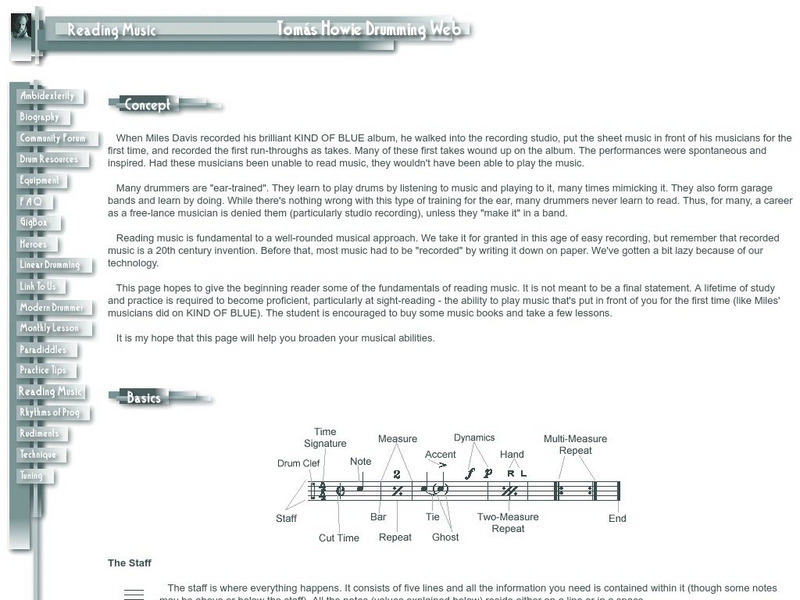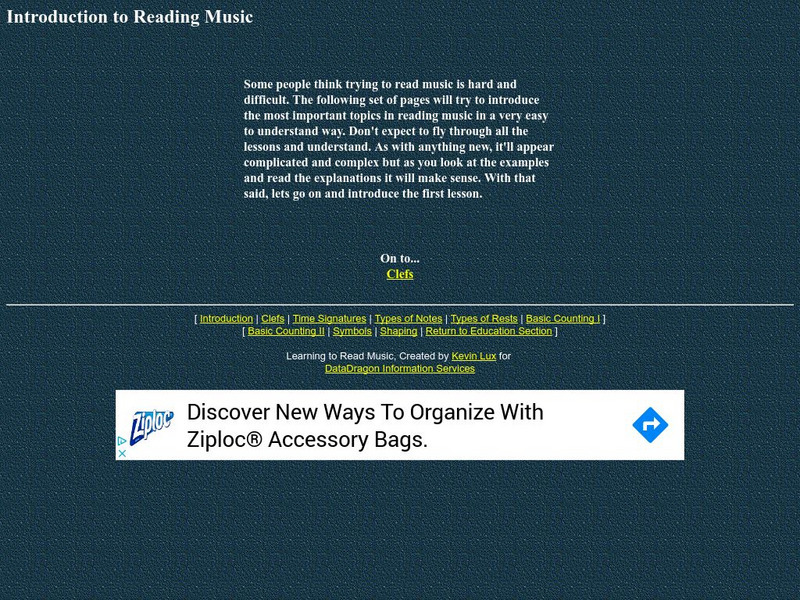Curated OER
No Man is an Island
Students sing the melody of the song, "No Man is an Island," in the Oneida native language. They memorize the song and discuss how the words demonstrate important feelings of the Oneida people.
Curated OER
Tapping the Trees-Traditional Oneida Song
Students practice singing the song, Tapping the Trees. They discuss the meaning in both the English and Oneida languages and how the words to this song demonstrate important feelings for the Oneida people.
Curated OER
A Country of Migrants?
Learners list reasons in support or rejection of the United States being a country of migrants through a written statement and discussion. They answer questions posed regarding immigration.
Curated OER
A Study of Japan with the Haiku of Basho
Sixth graders explore haiku poetry and the works of the Japanese poet Basho. They review characteristics of haiku poetry and other forms of poetry. After they write three or more haiku poems, they illustrate one of them and share with...
Curated OER
Hard Times
Young scholars take part in a lesson that demonstrates a learning cycle and can be applied to the practice of teaching in general. They prepare for learning, agree on learning outcomes, receive new information, construct new meaning,...
Curated OER
And The Winner Is
Students investigate the concept of The MTV Awards shows and how they have been used to form the culture of a generation over time. They view rerun episodes of the shows and write reflectively about observations that are made.
Curated OER
Compound Nouns
In this compound nouns instructional activity, students choose the correct words from the compound nouns and use the clues for help. Students complete 25 exercises.
Music Education
Introduction to Reading Music: Types of Notes
A tutorial for beginners learning to read music.
Music Theory
Music theory.net: Note Trainer
A fabulous tool for music teachers and students! This online quiz tests students knowledge of the various musical notes. (Click on "toggle" to check your answers along the way.)
Other
The Basics of Reading Music
This site is an overview of how to read music. The basics of notation such as note and rest values, the names of lines and spaces of both treble and bass clefs, etc. are covered. Includes downloadable audio files.
Music Theory
Music theory.net: Note Duration
A fabulous resource for beginners in music theory! Gives examples and explanations of the sixteenth note, eighth note, quarter note, half note, and whole note. The last page on this site provides a chart showing the relationship of each...
Music Education
Learning to Read Music: Types of Notes
Learn about the different types of notes in music--the whole note, half note, quarter notes, eighth note, and sixteenth note--and listen to midi files of music samples.
TED Talks
Ted: Ted Ed: How to Read Music
Like an actor's script, a sheet of music instructs a musician on what to play (the pitch) and when to play it (the rhythm). Sheet music may look complicated, but once you've gotten the hang of a few simple elements like notes, bars and...
Music Theory
Music theory.net: Keyboard Trainer
A fantastic resource for music teachers and students learning to play the piano. This online quiz can be customized to test students on specific keys. Students can click "Toggle helpers," to check answers along the way.
Music Education
Learning to Read Music: Basic Counting
Apply basic knowledge of reading music by counting beats and reading notes. Here are some simple lines of music which incorporate different types of notes and patterns in common time.
Other
Tomas Howie Drumming Web: Reading Music
This site is provided for by Tomas Howie and Drumming Web. Although originally written for the drummer, any aspiring musician could benefit from the explanation of how to read music and the examples it contains. Drummers will want to...
OpenStax
Open Stax: Catherine Schmidt Jones: Duration: Notes Lengths in Written Music
Read everything there is to know about the basics of notes. From their durations, their shapes and their stems, you will learn how notes are used in music.
Music Education
Learning to Read Music: Basic Counting, Part 2
Beginning musicians can practice reading notes and counting beats using this resource that also provides several lines of music with different types of notes, rests, and time signatures.
Music Education
Learning to Read Music: Time Signatures
Beginning music students learn the definition of time signature and examples of time signatures in music.
Music Education
Music Education: Introduction to Reading Music
A very simple explanation of the very basics of music reading. This is really good for the singer who wants to understand more about what is on the musical page. Not very advanced- very basic.
Music Theory
Music theory.net: Scale Degrees
A thorough explanation of scale degrees and the various names for each note. Provides illustrated examples and audio clips to enhance the lesson. Terrific resource for music students and teachers!
Music Theory
Music theory.net: Rest Duration
A wonderful resource for teachers and students! Gives examples and explanations of rests and how they affect the sound of a musical piece. Simple illustrations and explanations make this animated site easy to follow.
ClassFlow
Class Flow: Learning to Reading Musical Notes
[Free Registration/Login Required] In this flipchart students will learn to recognize lines, spaces, and notes on the treble clef staff. It contains interactive pages, 2 hand-bell songs, and a hand-bell video clip.
Alabama Learning Exchange
Alex: Line Notes and Space Notes
This lesson will help students determine whether the notes on a staff appear on a line or on a space. Students also will recognize how many lines and spaces are on a staff.


